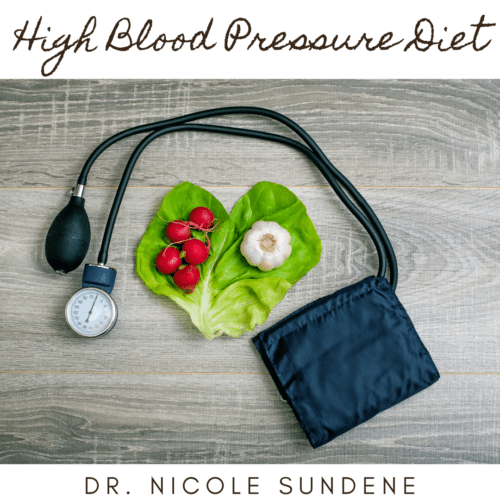
"Do hormones impact high blood pressure? I never had high blood pressure until menopause."
Dr. Nicole Sundene
Naturopathic Cardiology and Hormones
Hormones can impact blood pressure especially during a woman's forties and fifties with menopausal and perimenopausal changes. The reason for this is primarily our loss of progesterone. Progesterone relaxes the smooth muscles in our arteries and digestive tract which is why women often complain of stomach problems at the same time they develop high blood pressure.
Next thing we know around forty or fifty a lot of women make their first visit to an ER, urgent care, or Cardiologist for an EKG because their heart is suddenly racing or they have sudden onset high blood pressure that they never had before. While I highly recommend all my patients always work with an MD Cardiologist, I want to take a moment to explain what I actually do in Female Naturopathic Cardiology.
Keep in mind my patients have already been thoroughly worked up by the ER, sent to a Cardiologist, who then sent them to me because they know the problem is hormonal, they just don't know exactly what.
Thyroid hormones, are also notorious for causing high blood pressure, palpitations, chest pain, and oddly too low of blood pressure regardless if the thyroid hormones are too high or too low. Many times I have nagged a thyroid patient to check their blood pressure daily while starting thyroid hormones, only to have them report to me that their blood pressure is suddenly dropping to a normal range, and they don't need as much blood pressure medication.
Thyroid hormone increases the pulse rate because T3 stimulates the heart to contract. When we increase heart rate we generally increase blood pressure in our basic BP math equation. But this is where the interesting thing happens in women's health....women report their blood pressure has normalized. I believe this is because when the thyroid is deficient the heart is not contracting efficiently.
Insulin Resistance as seen in PCOS and Type 2 Diabetes, is a classic cause of High Blood Pressure that no doctor but me seems to test for. Insulin should be under <4 or it is causing an osmotic high blood pressure from too much sugar in your system.
Cortisol is the easiest hormone for my patients to wrap their brains around as we have all heard of the connection between stress and high blood pressure. Many times I have taken a patients blood pressure in the office and it is 200/100 and I am sending them to the ER or the doctor I was working for was screaming at them to go to the ER, while they are busy telling us they have "White Coat Hypertension."
Patients with "White Coat Hypertension" should check their BP daily with an Omrom BP machine, and also bring their machine in to appoinments to calibrate that the readings are the same as the more reliable doctor's office version that is not electronic. The electronic machines can be inaccurate from my experience using them for over twenty years. I only trust Omron brand as it was top consumer reviewed, and it is dangerous if you do not check your BP meter regularly against your Pharmacy or Doctor's office machine.
I wish women knew that the #1 thing they should do if they develop high blood pressure suddenly in midlife is to have a skilled hormone doctor check all their hormones to insure they are correct. Simply visit my SCHEDULE to get your BP hormones checked.
One thing everyone with high BP can do under the guidance of their own doctor, is to use my high blood pressure nutrients and lifestyle tips below and on my High Blood Pressure blog. I do not recommend using my "Hibiscus High Blood Pressure Tea" recipe without my Naturopathic guidance as not all cardiac herbs can safely be added to all cardiac medicines and this must be done under the guidance of someone that is skilled and experienced with doing this. While I want my patients OFF their BP meds or on doses that are low, I also know that stroke and kidney failure are the consequences women experience when they don't tend to their blood pressure. As it is the equivalent of driving your car around with half flat tires, and half over-inflated tires... something is bound to pop.
Aside from having hormones related to blood pressure checked, eating therapeutic foods for BP are the best way to avoid reliance on a blood pressure medication. If you already take BP meds and want to get off of them you need to work with a Naturopathic Doctor (preferably me 😉 add natural stuff in, monitor BP twice daily at 6am and 6pm when possible so you are keeping a consistent BP Log. I recommend grabbing a small half page sized spiral notebook and draw lines down the center so you can track on the top the date/time, BP, Pulse, and a space for notes like "forgot to take BP med" or "stressful day at work."
While high blood pressure is dangerous over the long term, too low of blood pressure is more of an immediate risk we are taking on by adding synergistic natural remedies for high blood pressure. We don't want the blood pressure to be too low or too high.
FOODS TO EAT TO LOWER BLOOD PRESSURE NATURALLY
To combat age related high blood pressure, and mild high blood pressure from menopausal changes, I do recommend eating as many foods known to reduce blood pressure as possible. By ensuring nutrients needed for cardiovascular health are sufficiently topped off we can prevent the need for taking blood pressure medications. Although I do prescribe them when women have high blood pressure because it should not go untreated.
It is a condition that occurs when the pressure inside of your arteries is too high. Because it is a silent disorder the only way to detect hypertension is to have your blood pressure measured.
THERAPEUTIC HIGH BLOOD PRESSURE FOODS
• Increase vitamin C-rich foods (citrus fruits, strawberries, red peppers, dark green leafy vegetables)
• Increase consumption of vitamin E-rich foods (almonds, hazelnuts, wheat germ, peanut butter)
• Increase consumption of magnesium-rich foods (soybeans, tomatoes, beans, walnuts, nuts & seeds, squash, broccoli, dark green leafy vegetables, tofu, wheat germ, halibut, swiss chard)
• Increase consumption of potassium-rich foods (grapefruit, grapes, tomatoes, beans, apricots, asparagus, beets, broccoli, corn, cucumbers, dates, salt-water fish, lamb)
• Increase consumption of calcium-rich foods (yogurt, sardines, salmon (canned with bones), milk, cheese, dark green leafy vegetables, broccoli)
• Try cooking with less salt. Experiment with spices such as, parsley, basil, oregano, ginger, sesame, dill, cilantro, curry, pepper, and thyme to reduce the amount of salt used in cooking
• Cut back on sodium, including that in processed foods and in many drugs (check labels for soda, sodium, or salt). Avoid commercial sauces like soy or Worcestershire and commercial salad dressings (check labels for sodium content)
• When eating out, ask for your food cooked without added salt
WHAT IS HIGH BLOOD PRESSURE?
Hypertension is a very common problem that affects about 50 million people in the United States alone.
That’s about 1 out of every 4 adults. It is more common as people grow older and is more common and more serious in African Americans.
What do the numbers mean?
Blood pressure measures the natural pressure created by blood pumping through your veins and arteries. Blood pressure is read as two numbers, one over the other. The top number, or systolic blood pressure, measures the blood pressure when the heart pumps. The bottom number, or diastolic blood pressure, measures the blood pressure between heartbeats when the heart rests.
Hypertension is blood pressure that is over 140/90
Optimal blood pressure is under 120/80
Risk factors you can control
9 out of every 10 people who have hypertension do not have a known cause for their condition. A family history of hypertension is a risk factor for developing the condition.
WHAT LIFESTYLE CHANGES WILL LOWER MY BLOOD PRESSURE?
• Keeping your weight under control
• Keeping physically fit
• Eating a healthy diet low in sodium and rich in nutrients potassium, magnesium and calcium
• Limiting alcohol intake (no more than 2 mixed drinks or two 12 oz. cans of beer or two 6 oz. glasses of wine daily)
• Never smoking or quitting immediately
• Avoiding medications that might increase your blood pressure like decongestant nasal sprays and pain medications called non-steroidal anti-inflammatory drugs (NSAIDS) aspirin, tylenol, ibuprofen, naproxen.
EXERCISE AND HIGH BLOOD PRESSURE
Start slowly and build up gradually. American College of Sports Medicine (ACSM) recommends 20 to 60 minutes of aerobic activity 3 to 5 days per week. Aerobic activity will strengthen your heart and reduce your risk of developing heart disease. It will also help to control your weight. Try brisk walking, jogging, biking, hiking, group exercise classes (water aerobics, kick-boxing, judo), running stairs, rowing, and team sports (football, soccer).
CONSEQUENCES OF IGNORING HIGH BLOOD PRESSURE:
Routinely monitoring your blood pressure is important. If you really want to upset any doctor, tell them you are not treating your high blood pressure. "I am not worried about it," I have heard many women state over the years. I promise that I will freak out, your MD will freak out. Everyone will freak out because you could have a stroke and suddenly drop dead. While I don't like my patients on high blood pressure medications they need to stay on them, until the "Root Cause" has been addressed and I have determined it is time to taper them.
Hypertension has been called a “silent killer” because it has no specific symptoms and it can lead to death. A dangerous disease that has no symptoms oftetimes results in the story of someone that just suddenly dropped dead in the middle of a family activity.
People who have hypertension that is not treated with lifestyle modifications and medications (if necessary) are likely to experience one or several of the following conditions:
• Coronary artery disease, heart attack, heart failure, or abnormal heart beat.
• Kidney failure
• Peripheral vascular disease, hardening and narrowing of the arteries (atherosclerosis) that supply blood to the arms, legs, and other parts of the body
• Retinopathy, or damage to the tiny blood vessels that supply blood to the light-sensitive lining of the back of the eye
• Stroke
Need help with testing or treating your hormones for high blood pressure? Simply visit my SCHEDULE page to treat yourself to a Naturopathic Hormone visit! I would be happy to help!
Dr. Nicole Sundene
(480) 837-0900
Dr. Sundene is a Naturopathic Doctor in Scottsdale, Arizona, and is considered a Female Hormone Specialist in Women's Health and Bioidentical Hormones. She specializes in Holistic Women's Health for Menopause, Thyroid, Hashimotos, PMS, Perimenopause, Autoimmune, Postpartum, Chronic Fatigue, Depression, Anxiety, Food Allergies, Digestion, Dermatology , Acne, Psoriasis, Eczema and Adrenal Hormonal Conditions. In 1999 she began working for a Hormone Doctor prior to starting Naturopathic Medical School. With over 22 years of experience in both Prescription and Natural women's health and hormones she presents to women the best integrated health solutions for their Chronic Disease. She has been an Herbalist for over 27 years and enjoys teaching women how to use herbs to balance their hormones, nutrition and optimize their health. Dr. Sundene relies on blood testing for her hormone metrics. The hormone testing is covered per the patient's insurance plan and conducted at certain points in the woman's menstrual cycle. To learn more about Hormone Testing for Women Visit: Bioidentical Hormones. Follow Dr. Sundene on Instagram, Twitter and Facebook for more tips on Women's Health, Female Hormones and Naturopathy!


